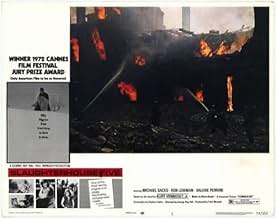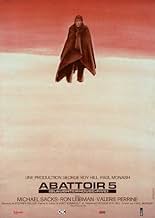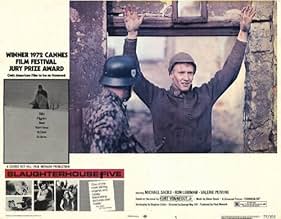बिली पिलग्रिम रहस्यमय ढंग से समय से अलग हो गया है। वह न्यूयॉर्क में अपने जन्म से लेकर एक दूर के ग्रह पर जीवन और फिर 1945 में ड्रेसडेन की आगजनी बमबारी की भयावहता तक, अनियंत्रित रूप से आगे-पीछ... सभी पढ़ेंबिली पिलग्रिम रहस्यमय ढंग से समय से अलग हो गया है। वह न्यूयॉर्क में अपने जन्म से लेकर एक दूर के ग्रह पर जीवन और फिर 1945 में ड्रेसडेन की आगजनी बमबारी की भयावहता तक, अनियंत्रित रूप से आगे-पीछे यात्रा करता है।बिली पिलग्रिम रहस्यमय ढंग से समय से अलग हो गया है। वह न्यूयॉर्क में अपने जन्म से लेकर एक दूर के ग्रह पर जीवन और फिर 1945 में ड्रेसडेन की आगजनी बमबारी की भयावहता तक, अनियंत्रित रूप से आगे-पीछे यात्रा करता है।
- पुरस्कार
- 3 जीत और कुल 4 नामांकन
- German Leader
- (as Friedrich Ledebur)
- Young German Guard
- (as Nick Belle)
फ़ीचर्ड समीक्षाएं
Technically, the film uses the moments where Billy jumps in time as meaningful transitions. It interweaves lessons learned from one part of his life and applies it to the present moment (whenever that is). The film's real treasures are the supporting characters that surround Billy. It also vividly transports you to WW2, a semi-autobiographical account of Kurt Vonnegut's real life experiences in Dresden. The film is filled with anecdotes that present the film's other main theme, that life is indeed ironic.
I was deeply touched by this film, with it's ability to whisk you from scenes of horror to amusing 'Kodak moments'. The music poignantly represents these transitions, and helps to carry the film. In the end, you can accept his death, by having lived his life.
If there's a weak element of the film, it's the bombing itself. By never letting the audience see outside the bomb shelter Pilgrim was in (and if so, not making it vivid enough for me to remember it), the horror and sheer magnitude of the event is downplayed. Two hundred thousand people died in the destruction of one of the greatest, most majestic cities in all of Europe, and all we're given is a shaking camera. Those who've read the book know that the trajedy was conveyed all to well by Vonnegut's skillful, near-photographic descriptions of the event and its aftermath. Very little of it made it to the screen.
Aside from that, George Roy Hill does an excellent job of communicating the existential dread of what must have been thought to be an unfilmable novel. The fate of Pilgrim's wife through her reckless driving could have come off as tasteless black comedy, but any cheap laughs are thankfully avoided, and the sequence is as shocking as it is heartbreaking. The really far-out parts of the novel (the four-dimensional aliens, Vonnegut's conception of the future and the end of the universe) are done with complete seriousness; another director might have had a condescending approach to the material, and killed the magic. The novel, by itself, is one of the best I've ever read -- it gleefully trashes the rules of standard novel-making, narration, and continuity, and manages to tell a real whale of a tale (there's a lot of weird stuff to swallow in it.) When I saw Hill credited as director, I moaned in agony, recalling the headaches that were induced by his smug, syrupy box office smashes "Butch Cassidy and the Sundance Kid" and "The Sting." After those two, I gave up all hope in Hill, the same way I did with Richard Lester after "Petulia" and "Help!" By the end of the movie, however, I ate my words. It's a beautiful, thought-provoking, and enchanting film, and does justice to a fine novel.
The book is also brilliant, but none of Vonnegut's work is easily adapted to the medium of film. Not quite the task Cronenberg took on when he directed Burrough's Naked Lunch, but very similar in method.
S-5 exposes us to the life of Billy Pilgrim (Michael Sacks) and his many loves (his dog spot, his wife played by Holly Near and an actress played by Valerie Perrine), as he either blacks out and travels into the deep recesses of his memory experiencing the delusion of time travel or (as indicated by his occasional leaps forward in time), he actually has become 'unstuck in time.' Between trips back to Dresden during its WWII bombing and trips forward to the planet Tralfamador, it seems that Billy is constantly tripping. Yet he manages to build a successful and very normal American life despite his bizarre and uncontrollable time-travel habit.
The film illustrates the non-linear manner in which the book is written by skipping from time to time in a seemingly random manner, but it manages to do so without losing focus on Pilgrim, who is, in fact always living in the present regardless of what time he happens to be experiencing. Fantastic directoral method!
The film makes a lot of subtle, simple and very good points by making Billy - a quiet simple guy with an extraordinary set of circumstances in his life - a true hero simply because he is relatively nice, somewhat aloof, happy, and quite normal. Sacks' performance is spot-on.
This film is beautifully photographed, very well paced, perfectly directed and edited. The acting is all quite good, and comes from a well appointed cast mostly consisting of character actors. I was particularly impressed with Eugene Roche's excellent portrayal of Edgar Derby.
Highly recommended for the art-house crowd and friends of intelligent sci fi.
But George Roy Hill did an excellent job conveying the overall feel of the book -- the time jumping was flawless and I didn't find it hard to follow at all. The actor who played Billy Pilgrim captured Billy's passive, calm and vaguely anti-social demeanor. Lazarro, Montana and Billy's wife are also well played.
George Roy Hill had a knack for directing movies made from great books -- e.g., "The World According to Garp" -- and in the end, I was pleasantly surprised how well this movie turned out.
As far as the Vonnegut adaptations go (I know of four -- this one, "Mother Night," "Breakfast of Champions" and the god-awful "Slapstick") this one is the best of the bunch.
I've always wanted to see a movie version of "Sirens of Titan," but it'll probably never happen -- so "Slaughterhouse Five" is my only chance to "see" Trafalmadore.
Recommended to any true Vonnegut fans. Other people probably won't appreciate it.
क्या आपको पता है
- ट्रिवियाAlthough Kurt Vonnegut Jr.'s renowned refrain, "And so it goes", appears over 100 times in the novel, it it is not uttered even once in this film.
- गूफ़When Billy Pilgrim is asked by the American soldiers, "Where's your rifle?", he replies that he doesn't have one because he's a chaplain's assistant. However, in the United States Army, the primary duty of the chaplain's assistant in a combat zone is to protect the chaplain, so all chaplain's assistants must carry rifles. Because Chaplains are considered ministers in uniform they are forbidden from carrying weapons even when in combat zone.
- भाव
Billy Pilgrim: [in his sleep] You guys go on without me. I'll be alright.
Prof. Rumfoord: All he does in his sleep is quit, surrender, and apologize. I could carve a better man out of a banana.
- क्रेज़ी क्रेडिटThe Universal logo does not appear on this film.
- साउंडट्रैकConcerto No. 5 for Harpsichord in F minor, BWV 1056 - 2nd movement 'Largo'
Written by Johann Sebastian Bach (as J.S. Bach)
Performed by Glenn Gould, Piano
Columbia Symphony Orchestra
Vladimir Goldschmann, Conductor
टॉप पसंद
- How long is Slaughterhouse-Five?Alexa द्वारा संचालित
विवरण
- रिलीज़ की तारीख़
- कंट्री ऑफ़ ओरिजिन
- आधिकारिक साइटें
- भाषाएं
- इस रूप में भी जाना जाता है
- Schlachthof 5
- फ़िल्माने की जगहें
- प्राग, चेक गणराज्य(as Dresden)
- उत्पादन कंपनी
- IMDbPro पर और कंपनी क्रेडिट देखें
बॉक्स ऑफ़िस
- बजट
- $32,00,000(अनुमानित)
- चलने की अवधि1 घंटा 44 मिनट
- ध्वनि मिश्रण
- पक्ष अनुपात
- 1.85 : 1
इस पेज में योगदान दें







































